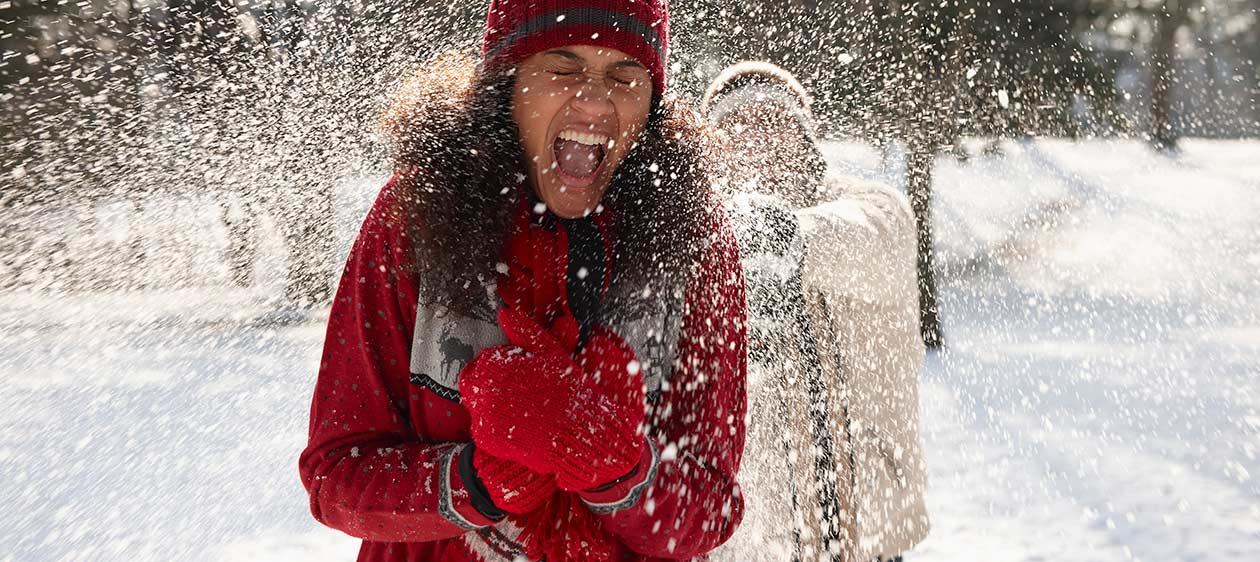
Protecting your home from freezing weather
Our top tips for protecting your home against the freeze conditions winter throws at us.
Published:9 January 2023
Topics:
Freezing weather advice
What to do if you have a burst pipe
We see a big increase in the volume of burst pipes during periods of freezing weather. When water freezes in pipes, it expands, which causes damage to plumbing and can lead to a leak, particularly when the ice starts to thaw. If you suspect a leak, follow these steps if you can.
- Turn off your water - if you have a burst pipe you will need to turn off your water using the stopcock/valve. This is usually located in a room with a water supply and often on the ground floor. This looks like a metal tap and should be rotated clockwise until it’s completely closed.Turn off your water - if you have a burst pipe you will need to turn off your water using the stopcock/valve. This is usually located in a room with a water supply and often on the ground floor. This looks like a metal tap and should be rotated clockwise until it’s completely closed.
- Use a bucket or something similar to catch as much of the water as you can. Wrapping a towel around the leaking pipe can also help to reduce water escape.Use a bucket or something similar to catch as much of the water as you can. Wrapping a towel around the leaking pipe can also help to reduce water escape.
- Turn off the electricity - if leaking water is a risk to your home’s wiring, turn off the electricity at the fuse box.Turn off the electricity - if leaking water is a risk to your home’s wiring, turn off the electricity at the fuse box.
How to protect your home from the cold
There are steps everyone can take to minimise the risk of a leak because of cold weather. Regular maintenance and monitoring can stop a leak happening. During the winter months it’s a good idea to take the following actions to protect your home when it’s freezing.
- Protect exposed plumbing - make sure any water pipes that are exposed to the cold, such as external taps, water pipes and storage tanks in the roof space are properly insulated. These exposed pipes are more likely to freeze.Protect exposed plumbing - make sure any water pipes that are exposed to the cold, such as external taps, water pipes and storage tanks in the roof space are properly insulated. These exposed pipes are more likely to freeze.
- Turn off outside taps - you can prevent outdoor taps from freezing by turning off their water supply. Check if you have an isolation valve on the indoor pipework leading to it and turn it off, making sure you remove all excess water inside once the supply has been turned off.Turn off outside taps - you can prevent outdoor taps from freezing by turning off their water supply. Check if you have an isolation valve on the indoor pipework leading to it and turn it off, making sure you remove all excess water inside once the supply has been turned off.
- Lag the pipe - if you can’t isolate the supply to an external tap. Use a thermal tap jacket which you can get from most DIY stores.Lag the pipe - if you can’t isolate the supply to an external tap. Use a thermal tap jacket which you can get from most DIY stores.
- Get your boiler serviced annually - a well-functioning system that is regularly maintained is a good way to minimise the chance of any issues when a cold snap arrives.Get your boiler serviced annually - a well-functioning system that is regularly maintained is a good way to minimise the chance of any issues when a cold snap arrives.
- Control the temperature of your system - if you have a smart thermostat use the anti-frost setting to keep your pipes from freezing. Otherwise, do not turn off your heating but instead maintain it at a low but consistent temperature.Control the temperature of your system - if you have a smart thermostat use the anti-frost setting to keep your pipes from freezing. Otherwise, do not turn off your heating but instead maintain it at a low but consistent temperature.
- If you are going to be away from home when it's very cold, turn off the water and drain your system or keep the heating on at a low level when the house is empty.If you are going to be away from home when it's very cold, turn off the water and drain your system or keep the heating on at a low level when the house is empty.
For more ways to protect your home, see our guide on preparing your home for winter.